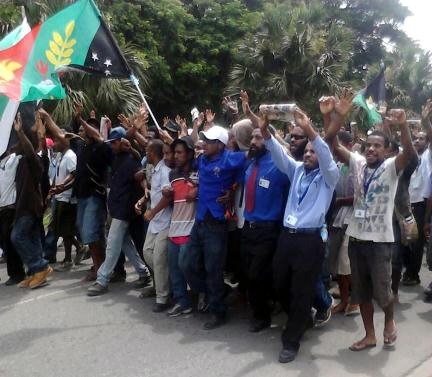A roundup of development policy issues in the Pacific by the Pacific Institute of Public Policy and the Development Policy Centre.
PNG protests
The Judicial Conduct Bill that was rushed through the PNG Parliament on March 21 has resulted in yet another vigorous constitutional debate. Criticisms of the bill came from numerous quarters, including leader of the opposition Dame Carol Kidu, NGOs and the PNG Chamber of Commerce and Industry. The most visible opposition came from UPNG students (led by those studying law) who marched peacefully and presented a message and petition to the prime minister’s chief secretary. Prime Minister O’Neill subsequently announced that enactment of the bill has been deferred until the Constitutional and Law Reform Commission reports to parliament in nine months time. Online, bloggers and members of the Facebook group, ‘Sharp Talk’ debated the motivations behind the bill and its implications. In addition, ‘Sharpies’ indicated their disappointment with coverage of this issue by traditional media outlets.
New king of Tonga
Tongans at home and abroad have been mourning the loss of King George Tupou V. The new monarch, King Tupou VI has already sent a message that economic restraint has to take precedence over traditional protocols by cutting costs associated with the state funeral of his late brother. Despite early speculation to the contrary, it appears unlikely that the new king will roll back the democratic reforms his predecessor had enacted during his brief reign. Meanwhile, the leader of the Democratic Party, ‘Akilisi Pohiva is continuing with his push for a full representative voting system.
Samoan economy recovering?
Samoa’s economy is continuing to feel the impacts of the global financial crisis. However, the Central Bank of Samoa has indicated some signs of recovery with remittances slowly increasing and tourism predicted to pick up in 2012. In addition, the World Bank has offered Samoa up to USD100 million in concessional finance and grants over the next five years through a country partnership strategy, the first for Samoa.
Sub-regional meetings in Melanesia…
The Melanesian Spearhead Group has met in Fiji to discuss trade and economic integration. Speaking on the eve of the grouping’s 25th anniversary meeting, the MSG director general, Peter Forau, outlined three areas of future focus: support to the Front de Libération Nationale Kanak et Socialiste (FLNKS), expansion of the MSG trade agreement to include trade in services, and greater unity among the Melanesian countries. The meeting concluded with leaders endorsing the MSG Framework Treaty on Traditional Knowledge and Expressions of Culture. In Fiji observing the MSG meeting were Luxembourg, Timor-Leste, China, Indonesia, Morocco and Russia.
…and Micronesia
The 17th summit of Micronesian chief executives concluded recently in Guam. The summit endorsed nine resolutions that set the roadmap for greater cooperation between the countries of Micronesia. This includes: health, sustainable finance, climate change, gender equality, youth services, and public broadcasting, biodiversity and workforce development. The overarching message of the meeting was that these guidelines would facilitate better regional cooperation in Micronesia. The governor of Guam, Eddie Baza Calvo observed that ‘the summit has resulted in a drive for a “One Micronesia” vision.’
Fisheries diplomacy in Guam
In Guam, 25 nations attended the eighth regular meeting of the Western and Central Pacific Fisheries Commission. This year’s meeting focused on setting quota levels for the world’s largest tuna fishery and developing conservation measures to reduce by-catch and overfishing.
The Australian Government failed to gain support for a proposal to reduce the incidence of whale by-catch, which is resulting in the same number of whales killed as the annual Japanese whaling quota for the Antarctic Ocean. The fishing nations did agree, however, to a US proposal for reducing the overfishing of white-tip reef sharks. But key conservation groups are disappointed with the outcome.
In brief:
- Fiji declares state of emergency as flooding continues.
- PM O’Neill has mobilised troops to restore order at the Hides LNG site in Southern Highlands.
- A controversy over logging in Solomon Islands threatens to embroil the PM.
- The Fiji military government has tightened its ownership rules for airlines.
- The government of Cook Islands has appointed its first deep-sea mining advisor.
- Pacific Islands News Association’s recent summit in Fiji re-ignited the war of words with the Pasifika Media Association.
- Australia’s governor general is touring the region accompanied by the parliamentary secretary for Pacific island affairs.
- Urban pressures lead to evictions in Port Vila.
- Resettlement of atoll questioned in Marshall Islands following nuclear clean up.
- Preparations are underway for the Pacific Arts Festival to be held in Solomon Islands.
- James Cameron becomes the first person in 52 years to visit the Mariana Trench.
- ‘Making Pacific migration work: Australian and NZ experiences‘ conference on Tuesday April 3 at ANU.
This biweekly roundup of development policy issues in the Pacific is a joint venture of the Pacific Institute of Public Policy and the Development Policy Centre. Editorial content is the responsibility of Derek Brien, PiPP Executive Director, and Stephen Howes, Devpolicy Director.



Leave a Comment